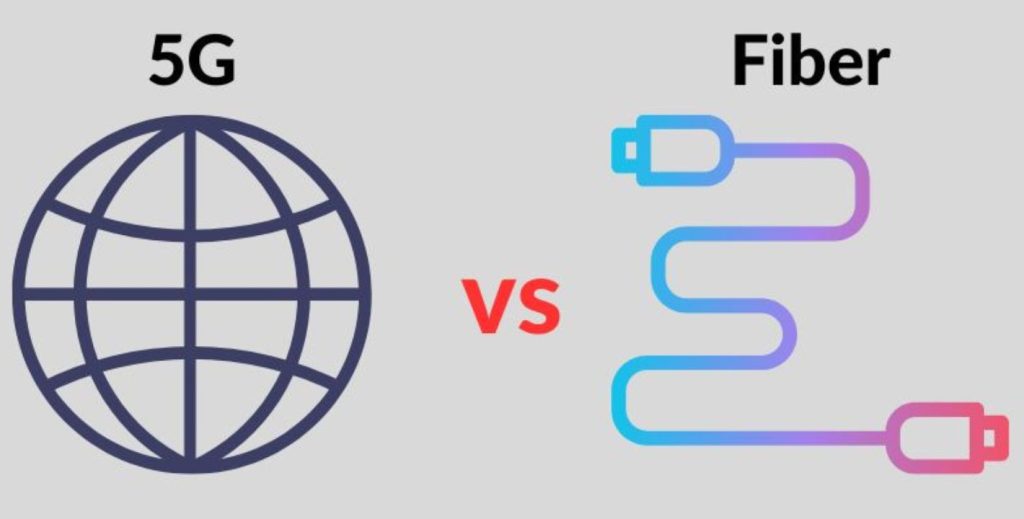By Candid8
April 10, 2025
Let’s be honest: if you’re running a business in Texas, your internet better not suck. Whether you’re grinding in an Austin coworking space or shipping cattle from a West Texas ranch, ISP providers in Texas are the lifeline keeping your operation alive. The big question in 2025? Should you bet on 5G or stick with fiber? At Candid8, we’re cutting through the hype to figure out which ISP services actually deliver for Texas businesses—and which ones leave you buffering.
5G: The New Kid on the Block
You’ve seen the ads—5G’s the future, right? ISP providers like Verizon and T-Mobile are pushing it hard for Texas businesses, promising wireless internet with speeds up to 1 Gbps. No cables, no fuss—just plug in a receiver and go. For a pop-up shop in Houston or a remote oilfield office near Midland, that’s a game-changer. Setup’s a breeze, and you’re not waiting weeks for a tech to dig a trench.
But here’s the Texas-sized catch: 5G’s only as good as its signal. ISP providers in Texas are rolling it out fast—Dallas and San Antonio are lit up—but if you’re stuck in rural Hill Country, you’re still dreaming. Walls, trees, even a good ol’ Gulf Coast storm can tank your connection. Candid8’s take? It’s flashy and fast, but it’s not ready to carry your whole business yet.
Fiber: The Steady Heavyweight
Then there’s fiber—hardwired, reliable, and packing speeds that make 5G blush (think 5-10 Gbps). ISP providers like AT&T Fiber and local champs like GVEC are bringing these ISP services to Texas businesses, from Austin tech startups to Dallas law firms. Symmetrical upload and download speeds mean your Zoom calls don’t lag, and your cloud backups don’t choke. If uptime’s your thing, fiber’s your king.
The downside? It’s not everywhere. ISP providers in Texas are wiring up cities like nobody’s business, but if you’re off I-10 in a nowhere town, you’re either waiting or writing a fat check for installation. Candid8’s blunt truth: fiber’s a beast—if you can get it.
Head-to-Head: What Texas Businesses Need to Know
So, how do these ISP services stack up for your Texas hustle? Let’s break it down:
- Speed: 5G’s 1 Gbps is solid for most—until you’re streaming 4K or running a server. Fiber’s 5-10 Gbps laughs at that. Winner depends on your workload.
- Cost: 5G’s cheap—$50-80/month, no install fees. Fiber’s $70-200/month, plus setup costs that’ll sting. Budget folks, take note.
- Availability: 5G’s popping up like bluebonnets in spring, but rural Texas is still a dead zone. Fiber’s growing, thanks to ISP providers in Texas, but it’s a city slicker’s game.
- Reliability: Fiber wins, no contest. 5G’s great until a thunderstorm rolls through or your office is a concrete bunker.
- Scalability: Fiber grows with your team—add users, no sweat. 5G? Good luck if your crew doubles overnight.
Texas Tales: Real Businesses, Real Choices
A San Antonio retailer we know ditched cable for Verizon 5G—setup took a day, and they’re saving $50/month. But uploads crawl during lunch rushes. Meanwhile, a Lubbock farmer went with fiber from a local ISP provider in Texas. Took two months to install, but now they’re running drones and sensors like it’s 2030. Candid8’s take? Where you are—and what you do—decides this fight.
The 2025 Verdict: Who Wins?
- 5G’s Sweet Spot: Small businesses, startups, or anyone needing internet yesterday. It’s the “get it done” pick if you’re near a tower.
- Fiber’s Throne: Established companies, data-heavy ops, or anyone who can’t afford a hiccup. It’s the champ if ISP providers in Texas serve your spot.
- Texas Truth: Fiber’s still king for reliability, but 5G’s closing the gap—especially for scrappy underdogs who can’t wait.
No BS from Candid8: check your address with local ISP providers, then pick your poison. Texas businesses don’t have time for buffering—or excuses.
What’s Your Play?
What ISP services are you rocking in Texas? Drop a comment below—Candid8 wants the dirt on what’s working (or flopping) for you. Whether it’s 5G’s wireless buzz or fiber’s steady hum, your internet’s gotta match your hustle.

